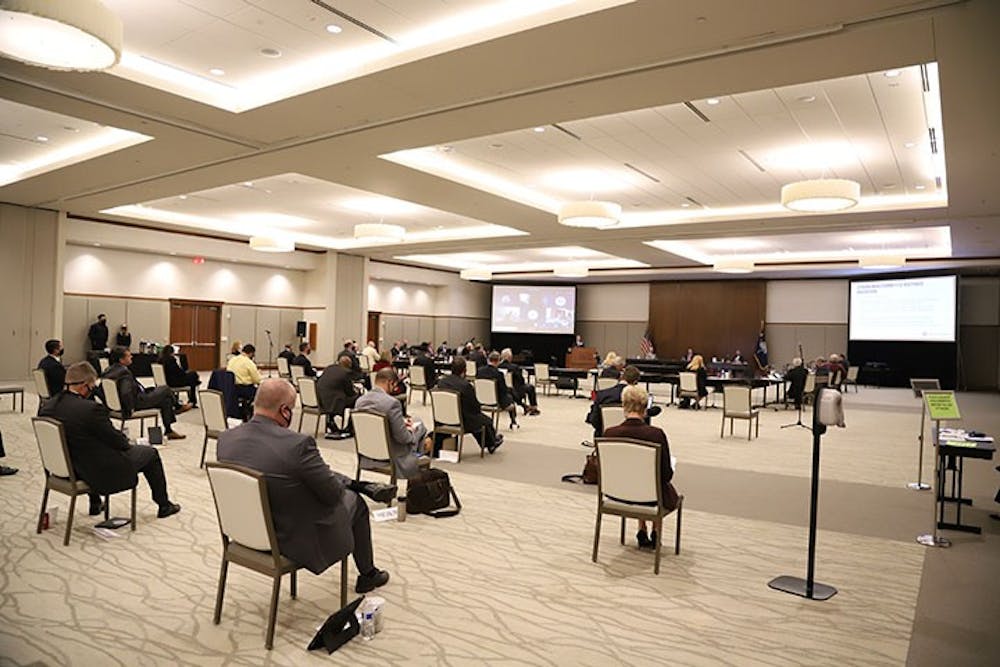"Voluntary separation programs" have been approved for use in multiple schools at USC.
The cost-saving programs work by "incentivizing" current faculty and staff to leave their jobs at the university so the schools can "realign resources," according to university controller Mandy Kibler.
Full-time equivalent faculty and staff can partake in the program as long as they have not had any indication of resignation accepted. Full-time equivalent employees include 12-month and nine-month positions.
Plans of the Colleges of Education, Social Work, Information and Communication and Engineering and Computing will be available to faculty and staff with 10 or more years at the university. Previous staff decreases in the College of Arts and Sciences caused its plan to target faculty with 25 years at the university.
"For example, in education, they were able to hire lower entry-level faculty and not pay them so much. As you see, Arts and Sciences are targeting those with 25 years; their salaries are quite, quite, high, and they can probably get junior faculty in, or other faculty, during that time," Kibler said.
The colleges will decide the incentives between the lower of two options. Three colleges have their incentives capped at a 20-week's salary or no more than $100,000. The College of Engineering will cap its incentives at a year's salary or $80,000. The College of Information and Communication will cap its incentives at a year's salary or $100,000.
Those who leave cannot be rehired by the university or state government for two years unless they pay back their incentive.
"They are not going to be refilled how they exist, but there could be a possibility of refilling it with a temporary faculty, an adjunct faculty, to cover a course, or those kinds of things. So, there may be some shifting of personnel; there could even be a lower-level faculty member," Kibler said.
Those who wish to leave must do so by the end of the year and will have 45 days to decide whether to partake in the program. The program must uphold its cost-saving aspect to continue.
The role of board members was also an issue addressed in the meeting.
Board member Walter "Terry" Parham went through multiple policies dedicated to addressing conflicts of interest, establishing the legal fiduciary duties and external influence designed to "put the interests and the needs of the university first" among board members. He called it the "common thread" of the policies.
"You have an obligation to act, at all times, selflessly, in the best interests of the university. These policies also are valuable in the sense they tell you, they spell out, what you should do if you are confronted with a situation which calls into question your compliance, or any other board member's compliance, with the duties and responsibilities outlined in the policies," Parham said.
Board members are required to sign a code of conduct and statement of commitment policy, which includes the policies Parham discussed, annually.
Additionally, the board approved a new vice president for development, Monica Delisa.
Delisa worked at Georgia College prior. At USC, she "will provide strategic oversight and management of the university's comprehensive development efforts and priorities," according to a press release.
During university President Bob Caslen's report, Caslen said USC is in a "fairly manageable state right now" when it comes to COVID-19, attributing it to a "vast majority of our students" who take the virus "seriously."
"I akin it to a mile run, if you ever ran a mile run, four laps. ... The first lap is normally a lot of adrenaline; second has some more adrenaline that kind of wears off; the third is just pure guts; the fourth lap you're going to get finished, so you're a little motivated again. But we're really on lap three," Caslen said. "This is where you need to be vigilant, and you cannot become complacent."
Correction Oct. 9 at 11:05 p.m.: A previous version of this article misstated who qualifies for the “voluntary separation program." Full-time equivalent faculty and staff qualify for the program, which includes yearlong and nine-month faculty and staff. Also, university controller Mandy Kibler’s name was spelled incorrectly on second attribution. The error has since been corrected.

